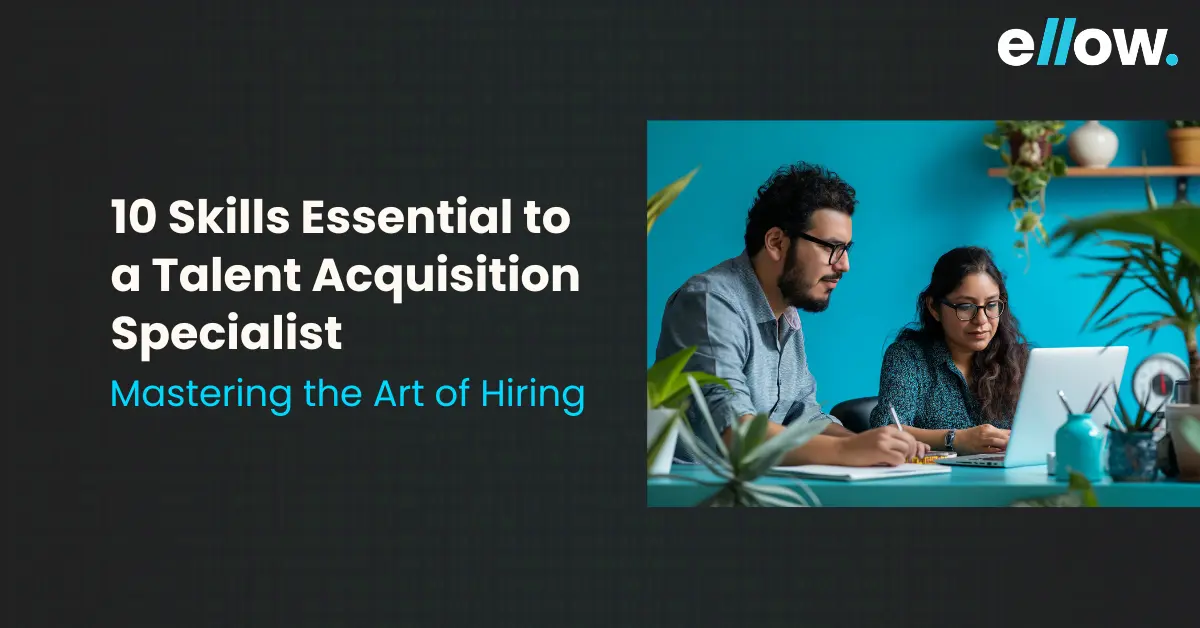Let’s build the future together.
Great ideas need great people. Partner with us to bring your vision to life, or take the first step in your career by joining our team of innovators.

Have you ever imagined yourself as the architect of a winning team? Building a high-performing company hinges on finding the perfect players in the business world.
That is where talent acquisition specialists, like talent scouts for the corporate game, step in. They sniff out the best individuals, ensuring the organization assembles a dream team.
The good news?
The Bureau of Labor Statistics predicts a stellar 7% growth in demand for human resources managers, which includes talent acquisition specialists, by 2031. That is faster than the average for all occupations!
But to truly dominate this exciting field, you must hone a specific set of skills. This article will be your playbook, outlining the essential qualities, practical examples, and pro tips to help you develop and showcase them.
Mastering these skills, you will become a magnet for top talent, propelling your career to new heights!
Talent Acquisition is the process of identifying, attracting, and hiring qualified candidates for job openings within a company.
This process includes a variety of activities, such as planning recruitment strategies, sourcing candidates from multiple platforms, reviewing applications, conducting interviews, and negotiating job offers.
Clear and continuous communication with both candidates and hiring managers is essential throughout. To be effective in Talent Acquisition, specialists need a unique set of skills to draw in top talent and manage the recruitment process efficiently.
Talent acquisition skills are crucial for professionals involved in hiring processes, enabling them to effectively discover and recruit suitable candidates for various job positions.
These skills encompass a range of practices, including sourcing candidates through different channels, evaluating their qualifications, and matching them with the right roles. Essential skills in talent acquisition include strong communication, keen observation, and strategic thinking.
Professionals such as talent acquisition specialists, HR executives, recruiters, and hiring managers leverage these abilities to ensure they select candidates who not only meet the job requirements but also fit well within the company culture.
They use tools like applicant tracking systems (ATS), networking platforms, and job boards to identify potential hires. Additionally, skills in conducting interviews, assessing technical and soft skills, and negotiating job offers are vital.
Effective talent acquisition ensures a company can attract and retain top talent, contributing to its long-term success and growth.
Talent acquisition specialists need to talk and write clearly. They must explain job roles and expectations to candidates and ensure that hiring managers understand the status of the recruitment process. Good communication helps build trust with candidates and keeps everyone informed and aligned throughout the hiring journey.
Effective communication also means adapting your style to suit different audiences, whether it’s a detailed email to a hiring manager or a casual chat with a candidate. This skill ensures that there are no misunderstandings and that the recruitment process runs smoothly.
Talent acquisition specialists need to understand and interpret data to make smart hiring decisions. They look at market trends to know which skills are in demand. They also create reports to show hiring managers what’s happening in the job market.
For example, if many candidates drop out of the application process, they might suggest ways to make it easier. By using data, they can find problems early and fix them to attract the best candidates.
Continuous learning is vital for talent acquisition specialists to keep up with evolving recruitment practices and technologies. This includes regularly attending workshops, webinars, and industry conferences.
Staying informed about the latest trends and tools helps specialists adapt their strategies, improving efficiency and effectiveness. Embracing new knowledge and skills ensures they can attract and retain top talent, keeping their company competitive in the job market.
These skills are essential because they enable specialists to navigate and utilize digital tools and platforms effectively. Talent acquisition processes today heavily rely on technology, such as applicant tracking systems (ATS) and various software applications.
Having a good grasp of these tools helps specialists streamline recruitment tasks, manage candidate databases efficiently, and leverage data insights for making informed hiring decisions. This technical proficiency ultimately enhances the overall efficiency and effectiveness of the recruitment process.
Listening skills are crucial for talent acquisition specialists as they interact with candidates and hiring managers daily. Actively listening involves paying attention to verbal and nonverbal cues, asking relevant questions, and showing empathy. By listening attentively, specialists can grasp candidates’ qualifications, preferences, and concerns, which helps in matching them effectively with suitable roles.
Similarly, understanding hiring managers’ expectations through active listening ensures smoother collaboration and alignment throughout the recruitment process, ultimately enhancing the overall candidate experience and recruitment outcomes.
Stress management is vital for talent acquisition specialists to handle the demanding and fast-paced nature of their roles effectively. By mastering stress management techniques like prioritization, time management, and delegation, specialists can maintain productivity and focus amidst tight deadlines and multiple tasks.
Engaging in activities such as exercise, meditation, or deep breathing also helps in reducing stress levels. Overall, effective stress management ensures that specialists can perform their jobs efficiently and maintain a healthier work-life balance.
Negotiation skills are vital for talent acquisition specialists to achieve agreements that satisfy both candidates and hiring managers. These skills involve understanding the needs and concerns of each party, effectively communicating to find common ground, and creatively solving conflicts that may arise.
By mastering negotiation, specialists can ensure fair compensation packages, resolve differences in expectations, and ultimately secure top talent for their organizations. This ability fosters positive relationships and contributes to successful long-term hiring outcomes.
Empathy in talent acquisition means understanding and sharing the feelings of candidates. It involves putting yourself in their shoes to grasp their perspectives, challenges, and aspirations. By demonstrating empathy, a specialist can create a more positive candidate experience.
This approach builds trust and rapport, increasing the likelihood that top talent will choose to join the organization. Overall, empathy enhances the recruitment process by fostering meaningful connections and aligning candidates’ needs with the company’s culture and values.
Effective time management is crucial for talent acquisition specialists as they often handle multiple job openings simultaneously. By prioritizing tasks, planning strategically, and tracking progress, specialists ensure that recruitment processes stay on track and candidates receive timely responses and feedback.
This skill allows them to navigate unexpected challenges and change priorities efficiently without compromising the quality of their work or missing important deadlines. Good time management ultimately contributes to achieving hiring goals and maintaining a smooth recruitment flow.
Problem-solving skills are vital for talent acquisition specialists to address challenges that may arise during the hiring process. Whether it’s overcoming candidate sourcing difficulties, resolving scheduling conflicts for interviews, or handling unexpected changes in job requirements, effective problem-solving ensures that recruitment efforts stay on track.
Specialists need to analyze issues, develop solutions that consider both candidate and company needs, and implement them efficiently. This ability not only streamlines processes but also enhances overall candidate experience and organizational efficiency.
Practice your soft skills in various settings, both professional and personal. Enhancing these skills can boost your performance and foster better relationships with colleagues and others in your network. For example, if you aim to improve your communication skills, consider leading a discussion group or giving a presentation at a local event.
Expand your hard skills by relying on credible resources and services. As a talent acquisition specialist, learning from industry experts can greatly enhance your expertise. Explore options like reading industry publications, attending workshops, or joining professional networks. Connecting with a mentor can also provide invaluable guidance and insights.
Set clear, measurable objectives and develop action plans to reach them. For instance, if you want to master new recruitment techniques, set a goal to learn two new methods within the next month and allocate time each week for practical application. Breaking down larger goals into smaller, manageable tasks helps track progress and ensures continuous improvement in your professional development.
Here’s a more detailed explanation of each tip for using talent-hunting skills in the workplace:
It is crucial to start by understanding which positions are currently open within your company. By prioritizing these vacancies, you can focus your efforts on sourcing candidates who fit these specific roles.
This approach helps in creating a structured plan for recruiting talent, including setting timelines for different stages of the recruitment process. For example, you might decide to allocate more resources to positions that are critical or have been open for a longer period.
Talent acquisition isn’t just about filling immediate vacancies; it’s also about building relationships with potential candidates who may be a good fit in the future. Keep a database or list of promising professionals who you’ve connected with but who are not available right now.
This could include skilled individuals you’ve met at industry events, through referrals, or even previous applicants who showed potential but weren’t selected at the time. Regularly check in with them, update them on any developments within your organization, and inquire about their current career status and interests. By maintaining this ongoing communication, you keep your company on their radar for future opportunities.
When interacting with potential hires, your attitude and demeanor play a significant role in shaping their perception of your company. A positive and friendly attitude can make candidates feel welcomed and valued, even if they ultimately decide not to join your organization immediately.
Simple gestures like offering a genuine smile, maintaining eye contact, and adopting an open posture can convey professionalism and respect. These non-verbal cues can create a favorable impression and contribute to a positive candidate experience, which is crucial for attracting top talent.
Securing top talent is crucial for organizational success in today’s competitive business landscape. However, identifying and hiring the right candidates requires expertise. That’s where talent acquisition specialists play a pivotal role. Their experience and insights are invaluable in making informed hiring decisions.
At ellow.io, a reputable talent acquisition company, we understand the significance of selecting skilled professionals who align with your organization’s goals and culture. Our approach integrates advanced methodologies to identify and attract top-tier talent, ensuring your team comprises individuals who can drive innovation and growth.
By leveraging our services, you gain access to a network of qualified candidates and strategic insights tailored to your industry’s demands. This ensures that every hiring decision is well-informed and contributes to your company’s long-term success. Visit ellow.io to discover how our tailored solutions can enhance your recruitment strategy and empower your business to thrive in today’s dynamic market.
Recommended Read: How ellow Can Accelerate Your Hiring Process
A talent acquisition specialist needs skills such as sourcing, interviewing, negotiation, and strong communication abilities. They also require analytical thinking to assess candidates effectively.
Proficiency in HR technology and applicant tracking systems (ATS) is crucial for managing large volumes of candidate data efficiently. It helps streamline processes and improve candidate experience.
Networking is essential as it allows specialists to build relationships with potential candidates and industry professionals. Strong networks help in sourcing passive candidates and gaining insights into market trends.
Understanding organizational culture helps specialists assess cultural fit among candidates. It ensures that new hires align with the company’s values and work environment, contributing to long-term retention.
Continuous learning keeps specialists updated with industry trends, recruitment strategies, and legal changes. It enhances their ability to adapt and innovate in sourcing and attracting top talent.

From Code Generation to Bug Detection: 10 AI Tools Every Developer Should Know in…

Ten Real-World Ways Enterprises Are Using AI Teams to Build Faster in 2026

The Future of Tech Teams and How AI Augmented Engineering Is Reshaping Product Delivery
Please feel free to share your thoughts and we can discuss it over a cup of tea.
Get a quote
From Code Generation to Bug Detection: 10 AI Tools Every Developer Should Know in…

Six Things to Consider When Hiring Remote Talent

ellow.io enters remote hires market with AI-based screening process